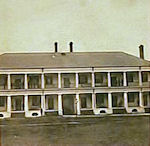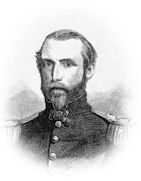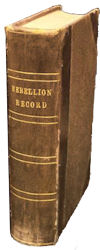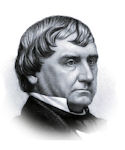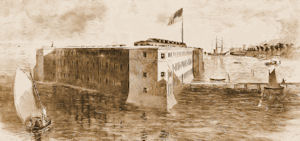FORT SUMTER, S.C., January 27, 1861.
(Received A. G. O. January 30.)
Col. S. COOPER, Adjutant-General:
COLONEL: I have the honor to state, in reply to your letter of the 24th instant, that our letters, &c., are sent by boat, daily, at 12 m., to Fort Johnson in a sealed package, addressed to the postmaster in Charleston, and that the return boat brings our mail in a package bearing the post-office seal. I am satisfied with the existing arrangement. The governor told Lieutenant Talbot, when he saw him on his return from Washington, that I might, if I chose; send up to the city for my mails, but that he thought it would not be judicious for me to do so. I do not apprehend that there would be the slightest danger of any of my men deserting if thus employed, but think they might be insulted or maltreated. The report to which you refer, about the attempt of the men who were sent to the city to attend a murder trial to desert, is absolutely and entirely false. Lieutenant Davis (who refused to take them, though offered arms by several persons and urged to accept them) says that the men conducted themselves with the greatest propriety, and that, although handsomely entertained, they returned perfectly sober. I have not deemed it advisable to notice in any way the false reports which have originated in Charleston and elsewhere about us. I send herewith a slip containing two such reports. Lieutenant Meade states, and I have no doubt with entire truthfulness, that he made no statement whilst absent to any person about my preferences or my opinions, either military or political, and that the inferences given in the article in the Petersburg paper were not deducible from any facts stated by him. The other article, in the Baltimore paper, stating that a boat containing three of my men was fired into from Sullivan’s Island, is also entirely untrue. I cannot see the object to be attained by the circulation of such untruths. The object of one, which has been repeated more than once, that we are getting fresh provisions from the Charleston market, is apparent enough, viz, to show they are treating us courteously. But even that is not a fact. I send herewith a copy of a letter written to our former beef contractor about furnishing us with meat, &c., to which no reply has yet been received–why, I am unable to ascertain; so that, up to this moment, we have not derived the least advantage from the Charleston markets; and I can confidently say that none of my command desire to receive anything from the city for which we are not to pay. Under the daily expectation of the return of Lieutenant Hall, I have deferred sending in a memorandum of the commissary stores on hand. There are now here 38 barrels pork, 37 barrels flour, 13 barrels hard bread, 2 barrels beans, 1 barrel coffee,½ barrel sugar, 3 barrels vinegar, 10 pounds candles, 40 pounds soap, and 3/4 barrel salt. You will see from this that for my present command (especially after the departure of our women and children) we shall have an ample supply of pork and bread. It is a pity that my instructions had not been complied with, which would have given us the small stores which are now deficient, and which we shall not object to receiving as soon as the safety of our country will admit of our getting them. Nothing of importance to report. The Columbia is still aground in the Maffitt’s Channel.
I am, colonel, your obedient servant,
ROBERT ANDERSON,
Major, First Artillery, Commanding.

[Inclosure No. 1.]
FORT SUMTER, January 24, 1861.
Mr. DANIEL McSWEENEY:
SIR: I am directed by Major Anderson, commanding this post, to ascertain whether you will furnish such fresh beef and vegetables as may be required here; the beef upon the terms of the contract under which you supplied Fort Moultrie; the vegetables to be purchased by you for us at fair market prices; the whole to be delivered as hitherto, four times in ten days, at some wharf in Charleston, for transportation to Fort Johnson, where it will be received by this garrison. This arrangement, which has been approved by the governor of South Carolina, it is desired shall go into effect immediately, and if you consent to it, you can send 184 pounds of flesh beef at a time, at such hour and wherever Quartermaster-General Hatch (120 Meeting street) may advise you. Of the vegetables you will be further directed. Please acknowledge the receipt of this as soon as possible, in order, if necessary, that other arrangements may be made.
Respectfully, your obedient servant,
T. SEYMOUR,
Captain, U. S. Army.

Copy of extracts from Baltimore Sun and Petersburg Daily Express
[By telegraph for the Baltimore Sun.]
THE LATEST FROM THE SOUTH.
FROM SOUTH CAROLINA–A BOAT FROM FORT SUMTER FIRED AT BY THE SOUTH CAROLINIANS—HON. JEFF. DAVIS SPOKEN OF FOR PRESIDENT OF THE SOUTHERN CONFEDERACY.
CHARLESTON, JANUARY 23.–The battery on the beach at Sullivan’s Island fired into a boat from Fort Sumter on Monday. There were three men in it, who approached the beach with muffled oars. The sentry at the battery hailed them and warned them on. Failing to obey the summons, the sentry fired musketry into the boat, when it turned round and went away. Soon after those at the battery heard a noise like the hauling up of a boat at Fort Sumter. One of the men in the boat is said to have been wounded badly. Their object is supposed have been desertion, but some say it was a desperate effort to run the gauntlet of the sentries and spike the guns of the battery.
[The Daily Express, Petersburg, Va., Tuesday morning, January 22, 1861.]
COMING TO THE POINT–A PRACTICAL MOVEMENT.
THE POSITIONS OF MAJOR ANDERSON.–Lieut. R. K. Meade, of the Engineer Corps, at Fort Sumter, has been in our city, on a visit home, for several day’s past. Several gentlemen with whom he has conversed inform us that he speaks in the highest terms of Major Anderson, not only as a brave and fearless soldier, but as a strong and true Southern man, his position in the present state of affairs, however, rendering it impossible for him to take any other position before the people of the South and of the Union. He does not feel in the slightest complimented by the fanatical cannon firing in his honor at the North, and it is with pain, not fear nor even embarrassment, that he realizes the present attitude of the South towards him. That he loves the South, that he prefers it, every social tie gives ample testimony. He is bound by the holy ties of wedlock to one of the fairest of the fair of Georgia, a daughter of General Clinch. He has four devoted brothers, every one of whom, it is said, is a strong secessionist. Add to this that he is a Southerner by birth, and a descendant of Revolutionary sires, we need hardly more to give us assurance that he not only loves his native south, but will at the proper time, and in an honorable manner, draw the sword in her defense. These are simple references from facts as known. Not a syllable has fallen from the lips of Lieutenant Meade to lead to the remotest deduction that Major Anderson will not perform his whole duty to the Government of the United States. But that he will be hand in hand with the South as soon as he may be, with honor, relieved from his portion, we have little to doubt.
MAJOR ANDERSON.–“A Comrade” writes to the Columbus (Ga.) Enquirer concerning the late removal of Major Anderson to Fort Sumter, and in defense of his action and character. The conclusion is: “Major Anderson is a Southern man–born and raised in the noble old ‘Dark and Bloody Ground.’ He will be found on the side of the South when this government is dismembered, and, when his critical position has been properly understood, his name will be fully exonerated from the grave charges which have been made against it by those who have been deplorably misinformed upon all the points of military honor which have governed this truly gallant and meritorious officer.”
